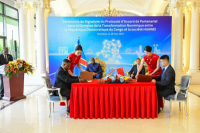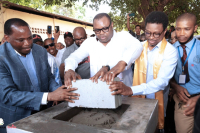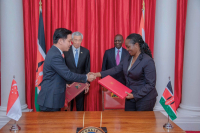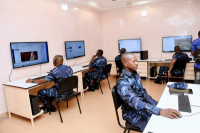
Public Management (483)
The Kenyan government is stepping up its efforts to accelerate the country's digital transformation. To achieve its objectives, the executive is counting on the support of international partners.
Korea Trade Centre (KOTRA) will support Kenya in the development of a master plan to guide the creation of the five digital cities selected by President William Ruto (Lamu, Dongo Kundu, Athi River, Sagana, and Naivasha). For that purpose, on Monday, May 29, in Nairobi, the Kenyan Ministry of ICT and Digital Economy and the KOTRA signed a memorandum of understanding.
The agreement also provides for the implementation of a smart mobility system encompassing an intelligent transport network using smart driving licenses.
According to ICT Principal Secretary John Tanui, the partnership is part of the government's strategies to create an enabling environment for innovation and emerging technologies. The Kenyan government "has played an enabling environment through various legal and regulatory frameworks to spur Kenya’s digital economy such as the National ICT Policy, Digital Economy Blueprint and National ICT Master Plan (2022-2032), among other policy interventions,” said John Tanui.
Indeed, when he came to power in September 2022, President William Ruto vowed his ambition to leverage digital tools for socioeconomic development. To this end, he planned various investments aimed at making the country a benchmark for digital transformation in Africa by 2027. Digital investments supporting this vision have been estimated at Ksh40 billion ($334 million).
The Smart Cities project should not only improve citizens' quality of life but also provide fertile ground for economic growth and job creation. It will offer solutions to the country's energy challenges by, among other things, implementing the Internet of Things (IoT) to strengthen ecosystems and enhance new technologies.
Samira Njoya
In the current digital age, accurate population data is a strategic asset to guide government planning. It informs the most effective actions to be taken before, during, or after any situation with direct or indirect consequences on the lives of millions of individuals.
Earlier today, Togo announced an agreement with French companies Atos and IDEMIA, for the development of a national electronic identification system. The two companies will design, build, test, and deploy a biometric solution that captures and process iris, face, and fingerprint data. On the sidelines of the GITEX Africa trade fair, taking place in Marrakech from May 31 to June 2, 2023, Alpha Barry, CEO of Atos Africa, said: "The biometric e-ID solution will play a crucial role in Togo's digital transformation and national development. Atos is committed to providing a reliable and secure solution that meets the needs of both government and citizens."
The digital solution will include a citizen portal, a mobile application, cybersecurity solutions, a central biometric system, enrolment kits, and a personalization system for the new electronic identity cards. It is a turnkey, integrated end-to-end solution to be built on a scalable infrastructure to meet Togo's current and future needs.
The French companies explain that the project also entails the opening of an Atos subsidiary in Togo to ensure the transfer of knowledge and skills to local staff to guarantee the independent and efficient operation of the system over the long term.
The national electronic identification system will support the national "e-ID Togo" project, which aims to allocate a unique identification number (UIN) to every resident in Togo. Thanks to the UIN and the biometric data collected, Togo will create a centralized, secure, and reliable database that will serve as a reference for verifying the identity of beneficiaries of public, private, or social services.
The project is part of the West African Unique Identification Program for Regional Integration and Inclusion (WURI), with an overall budget of $500 million financed by the World Bank.
Let’s note that the agreement was announced on the sidelines of the GITEX Africa trade fair being held in Marrakech (May 31-June 2).
Adoni Quenum, Marrakech
On January 13, 2022, the Pan-African Payment and Settlement System (PAPSS) was officially launched in West Africa. Despite its impressive benefits, this innovative solution is yet to be widely adopted.
On Monday, May 29, Kenya’s President, William Ruto (photo) called on his peers to take action for the widespread adoption of the Pan-African Payment and Settlement System (PAPSS). He asked them to encourage central and commercial banks to join the system. The official made the call during the African Private Sector Dialogue on the African Continental African Free Trade Area (AfCFTA) held in Nairobi.
“It is also imperative that we proactively seek a resolution to the disparities in currencies and the consequential impediments it poses to intra-African trade. Trade cannot take place without efficient and unified payment systems. [...] There is a mechanism where all our traders can trade in the local currency and we leave it to the Afreximbank to settle all the payments. We do not have to look for dollars; our businessmen will concentrate on moving goods and services and leave the arduous task of currencies to Afreximbank,” he said.
The PAPSS was launched in January 2022, one year after the operationalization of the AfCFTA. It aims to link African markets, enabling instant cross-border payments in local African currencies, whether for purchases, money transfers, salary payments, share trading, or high-value commercial transactions. According to Ghanaian President Nana Akufo-Addo, PAPSS is expected to save Africa 5 billion a year in payment transaction costs. However, most African countries are yet to embrace that innovative system. To date, only nine central banks, 40 commercial banks, and four switches have joined the PAPSS network.
For William Ruto, it is therefore urgent to take the first steps to get rid of the US dollar and mobilize for the adoption of PAPSS.
Samira Njoya
In a bid to digitize its whole administration and promote universal internet access, Egypt is working on a number of partnerships, including deals with German cooperation.
On May 31, the Egyptian Ministry of ICT signed a memorandum of cooperation with the German Agency for International Cooperation (GIZ) for the implementation of the first phase of the "Supporting e-Government and Innovation in the Public Administration (InnoPA)" project.
Under that memorandum, GIZ will support digital transformation and the promotion of e-government in Egypt. The agreement also includes the construction of an innovation laboratory that will develop an incubation program for emerging SMEs that want to build e-government applications to make government services accessible to citizens.
According to Amr Talaat, Minister of Communications and Information Technology, the memorandum is part of Egypt’s digital strategy and efforts to promote digital transactions in all aspects of life, and to achieve the transformation to a “paperless participatory digital government that relies on a solid and secure infrastructure".
Over the past ten years, the Egyptian government has made unceasing efforts to modernize its administration. Thanks to the reforms and flagship projects of its digital strategy, Egypt jumped 37 places in the global e-government index between 2003 and 2022. Egypt is now the 6th African country providing public services online, according to a sub-indicator of the UN e-Government Development Index (EGDI).
For Amr Talaat, this agreement represents a further leap forward in Egypt’s digital ambition and in the constructive cooperation between the German and Egyptian governments.
Samira Njoya
The Gauteng provincial government is committed to the well-being and security of its population. To achieve this, the executive has turned to digital technology, which offers suitable technologies for this purpose.
On Thursday, May 25, Gauteng's Department of e-Government presented the 2023/2024 budget, as well as the digital projects planned by the province's Department of Cooperative Governance and Traditional Affairs (COGTA).
According to Mzi Khumalo (photo, center), Gauteng's executive council member for e-government, research, and development, the ZAR1.7 billion ($86 million) budget prioritizes key ICT projects like the implementation of an e-policing strategy in the province.
“Amongst other projects, the department has sought to prioritize the procurement and management of crime-fighting technologies to establish e-policing for the Gauteng Province,” said Mr. Mzi Khumalo.
The sum allocated has enabled Gauteng province to acquire facial recognition CCTV cameras in Diepsloot, one of the areas identified as crime hotspots. The aim, according to Gauteng Premier Panyaza Lesufi, is to enable police to monitor the area 24 hours a day, and to highlight the ability of CCTV cameras to produce data that can be used in the fight against crime.
Other projects will also be implemented, including the acquisition of tracking devices to monitor vehicles, firearms, and other assets used in crime-fighting, and the manufacture of electronic panic buttons enabling the population to quickly contact the emergency services when in distress.
The Gauteng administration is also planning to develop a payment engine for cashless transactions for all provincial government departments and entities. There are also plans to continue providing services over the Gauteng broadband network (by providing Wi-Fi connectivity to schools, libraries, hospitals, community centers, and homes), to bring new services online, and to strengthen the youth’s ICT skills.
Samira Njoya
During his presidency, which began in May 2015, outgoing president, Muhammadu Buhari, successfully showcased Nigeria on the international tech scene. His successor wants to do even better over the next four years.
Bola Tinubu (photo), Nigeria’s new President sworn in on Monday, wants to leverage digital technologies to further develop the country.
To this end, he has drawn up a program focusing on seven areas: innovation and entrepreneurship, service provision and outsourcing, technology manufacturing, e-commerce, digitization of public services, broadband, and blockchain.
His team plans to implement policies to support local financing opportunities and access to capital to encourage foreign investors to continue investing in Nigeria. Policies to train and empower young people in ICT will also be developed.
They also plan to develop the e-commerce sector by upgrading the national transport infrastructure to provide nationwide services and meet the needs of consumers across the country.
The new government also wants to invest in the manufacture of technological products since it presents another major opportunity for job creation. Imported smartphones will be gradually replaced by local products from local assembly plants built to develop the tech manufacturing sector.
Concerning blockchain, the new President plans to reform government policy to encourage the prudent use of this new technology in finance and banking, identity management, revenue collection, and the use of crypto-assets.
Aware that all these projects will not come to fruition without good Internet connectivity, the new president is set on boosting broadband connectivity and providing high-speed internet to 90% of the population within the next two years. Currently, Nigeria's national fiber optic network is 98% complete, according to the government.
Universal Internet coverage will enable the use of public services, with further digitization expected for the coming months, we learn.
Mr. Tinubu targets one million jobs created in the ICT sector in his first 24 months in office.
In 2019, DRC published its digital transformation program, focusing mainly on the development of the digital economy to improve its contribution to GDP. To successfully implement that goal, it is counting on partnerships with countries like China whose digital economy contributed 41.5% to GDP in 2022.
China and the Democratic Republic of Congo (DRC) recently signed a memorandum of understanding to strengthen digital cooperation. The memorandum was signed in Beijing, last Friday, by Congolese Digital Minister Désiré Cashmir Eberande Kolongele and Chinese Minister of Foreign Affairs, Qin Gang, on the sidelines of President Félix Tshisekedi's visit to China.
"We both expressed our desire to enhance cooperation through win-win partnerships that will be mutually beneficial for our people. Our relationship has greatly evolved. In the DRC, many things symbolize the friendship between our two countries,” said President Félix Tshisekedi.
On Sunday, May 28, at the end of the Congolese president's visit, a new agreement was signed in Shenzhen between the Congolese government and tech giant Huawei. It aims to promote digital transformation in the DRC, particularly the digitization of government services. According to President Tshisekedi, it will enable the development of several areas, including energy, education, health, public finance, and security.
The partnerships signed during the visit are fully in line with the 2025 Digital Transformation Plan, published by the government in 2019. That plan aims to leverage digital technologies to improve integration, good governance, economic growth, and social progress.
Let’s note that President Félix Tshisekedi's visit to China is part of the celebrations marking the 50th anniversary of the normalization of diplomatic relations between China and the DRC.
Samira Njoya
The innovative project, a first of its kind in Africa, is launched to train the youth to prepare for the digital future and develop the digital economy.
On Saturday, May 27, Guinean Prime Minister Bernard Goumou (photo, center) officially launched the construction of a digital village in Ratoma, Conakry.
According to the government official, the digital village aims to make Guinea a major player in Africa’s digital revolution and an internationally competitive country.
The infrastructure will span over 46,707.12 square meters. It is co-funded, to the tune of $14.6 million, by the telecom regulator ARPT, the National Agency for Universal Service of Telecommunications and Digital (ANSUTEN), and the National Development Budget (BND).
It will host four academic and one administrative block, two buildings to house students, an amphitheater, a library, a teachers' residence, a sports center, secondary buildings, external landscaping and roads, and miscellaneous networks (VRD). It is expected to be completed within 12 months.
According to the initiator of the project, Vocational Minister Alpha Bacar Barry, the digital village will offer ongoing ICT training from primary school through to the university level. In addition to the digital education center, the village will also have a digital entrepreneurship center and a research and development center.
This ambitious project, the first of its kind in Africa, will stimulate the development of the digital sector and train a generation of Guinean talent capable of meeting the challenges of technological innovation. It will also draw the country closer to meeting its goal of creating a generation of digital champions to be able to fully capitalize on the global digital economy for growth by 2030.
Samira Njoya
The partnership aims to reinforce cooperation between the two countries, which aim to leverage digital technologies to drive economic growth.
Singapore and Kenya signed, Thursday (May 18), three agreements including a memorandum of understanding covering the digital economy. The agreements were signed during an official visit of Singaporean Prime Minister Lee Hsien Loong to Kenya.
On Twitter, Kenyan President Williams Ruto said the MoU on the digital economy will "facilitate cooperation on cybersecurity, digitization of government services and ICT capacity building.”
In Singapore, the digital sector is a key component of economic plans, and the sector has grown significantly in recent years. The Singaporean IT market was valued at $41.76 billion in 2021. It is expected to grow at a compound annual growth rate (CAGR) of 7.9% to reach $61.06 billion by 2026, according to a recent report by Global Data.
Meanwhile, last year, Kenya launched a 10-year digital master plan -covering the 2022-2032 period- to align with global technological advances and strengthen its digital economy. The digital master plan identifies four key pillars: digital infrastructure, digital services, and data management as well as digital skills and stimulating digital innovation for entrepreneurship.
According to the Singaporean Prime Minister, the MoU will further the bilateral relationship between the two countries by targeting economic opportunities that will bolster shared prosperity.
Samira Njoya
Burkina Faso is under a growing terrorist threat since 2015. To effectively respond to these attacks in the country, the government has turned to digital technologies, which offer a range of tools to counter insecurity.
The National Gendarmerie of Burkina Faso, on Tuesday, May 16, inaugurated its Digital Brigade for Alert and Assistance (BNVAA).
The brigade is accessible via its web platform and a mobile application “Ma Gendarmerie BF”, available on Playstore and Appstore. It aims to provide citizens with a direct and accessible communication channel with the national gendarmerie.
According to Lieutenant-Colonel Evrard Somda, Chief of Staff of the National Gendarmerie, the digital brigade "is a practical and quick way for the gendarmes to interact and respond to users’ concerns every hour of the day, monitor social networks to analyze the feelings of people on particular topics or detect subversive messages and comments, publish safety tips and alerts in case of incidents or disasters, and give recommendations to guard against burglary or online scams.”
The BNVAA is part of the Burkina Faso government's drive to leverage digital technologies to bring government services closer to the population. It was set up to support the national gendarmerie in its fight against growing insecurity.
The brigade will be managed by trained personnel grouped under two teams. The first team will oversee the collection and analysis of digital data and evidence and handle interactions with the population, through a chatbot assisted by a security agent. The second team will take care of the creation of awareness materials and produce intelligence reports on the security situation.
According to the executive, the objective is to optimize the performance of the gendarmerie by strengthening and consolidating its connection with citizens. The BNVAA also aims to ensure the physical presence of territorial brigades and intervention units, as well as reduce waiting times when citizens request their services.
Samira Njoya
More...
The country was initially scheduled to launch its satellite into orbit in 2021. Due to the coronavirus pandemic, the launch was postponed to 2023. So, it wants to make up for this delay in the coming months.
Senegal's space control center is set to be inaugurated by the end of June 2023, as announced by Professor Gayane Fay, the coordinator of the Senegalese space program at the Ministry of Higher Education. The announcement was made during a visit to the construction site in Diamniadio last Thursday, attended by a delegation from Montpellier University's Space Center and the Senegalese telecom regulator ARTP. The coordinator mentioned that ARTP and Montpellier University's Space Center would handle matters related to frequencies and other relevant topics.
In addition to providing infrastructure for satellite manufacturing and satellite services, the Diamniadio space control center will also serve as a training facility for professionals and conduct research. The center is a result of a memorandum of understanding signed, in January 2019, by the Ministry of Higher Education, Research and Innovation, the French National space center, and aerospace company Ariane Group. The memorandum encompasses the construction of the control center, the development of the Senegalese nanosatellite (initially planned for launch in 2021), and training for the satellite manufacturing team, which consists of eight engineers and five technicians.
Once launched, the satellite will establish connections with every station it passes over, collecting data recorded by those stations and transmitting them directly to the Diamniadio space control center. This data will contribute to the prevention and effective response to various challenges such as bushfires, floods, and soil erosion, while also supporting agricultural development.
Successfully deploying the satellite will position Senegal among the select group of African countries that possess around 40 satellites.
Samira Njoya
The visit aims to seek the expertise of Germany, which ranks among the most technologically advanced countries.
Egyptian Minister of Communications and Information Technology, Amr Talaat, was in Germany from Tuesday, May 9 to Friday, May 12, to seek international partnerships to build capacities and accelerate digital transformation in Egypt. According to a statement issued on Friday by the Ministry of ICT, the government official met with German officials, including Niels Annen, Parliamentary State Secretary to the German Federal Minister for Economic Cooperation and Development, as well as tech executives.
Among the tech executives he met were Ammar Alkassar, a board member and executive in residence at GovTech Campus Deutschland, which promotes cooperation between the private and public IT sectors. Amr Talaat also met with Johannes Bruder, the head of products at Delivery Hero, a German multinational online food ordering and delivery company based in Berlin, operating in over 70 countries. The two parties discussed the company's expansion to Egypt.
Additionally, the ICT Minister met with Dennis Walter, the EEMEA Vice President of Ottobock, a company specializing in prosthetics and orthopedic technology. They discussed collaboration in research and development (R&D) and assistive technologies. Another meeting was held with Steffen Kuhn, the managing partner of Detecon International's Digital Engineering Center (DEC), to discuss Industry 4.0 cooperation opportunities.
In March 2023, Egypt and Germany decided to enhance their IT cooperation. Germany, already well advanced in the sector, ranks among the most technologically advanced countries. In the Digital Quality of Life Index (DQL Index) published in October 2022, it ranked 3rd, just behind Israel and Denmark. The country plans to support Egypt in major projects, including the Supporting e-Government and Innovation in the Public Administration (InnoPA) project implemented in partnership with the German Agency for International Cooperation (GIZ). It also plans to establish a laboratory for the creation of government applications in Egypt shortly.
Samira Njoya
The dematerialization of public services and the construction of digital infrastructure are key components of the Democratic Republic of Congo’s digital transformation strategy. The proposals aim to support the implementation of those goals.
South African IT company Guma recently expressed its interest in the Democratic Republic of Congo’s digital industry. Last Thursday (May 4), Digital Minister Désiré-Cashmir Kolongele granted an audience to the company’s executive director, Maphum Nxumalo.
After the audience, Maphum Nxumalo explained that the discussions focused on digitalization, specifically on digital transformation processes. "We exchanged on the digital governance of the Congolese ecosystem, on how to make public information easily accessible to the population," he added.
The audience is granted in a context where the Democratic Republic of Congo is working to further develop its digital sector to greatly transform its economy by 2025.
Since 2019, through the National Digital Plan (PNN), the executive is working to modernize infrastructure, extend telecom coverage, boost access to digital tools, and secure digital content channels, among other things. To successfully implement that strategy, the country opened its doors to foreign investors specializing in digital technology.
Guma, which has over 30 years of experience in the field, wants to be one of such investors and provide its expertise in several areas including the dematerialization of administrative processes.
Samira Njoya
Despite significant investment by the government in mobile telecommunications services, a significant portion of Nigeria's population still lacks access to them. Parliament is seeking answers regarding the reasons behind this delay.
The Nigerian House of Representatives on Tuesday, May 9, launched an inquiry to determine why the Nigerian Communications Commission (NCC) has failed to promote the widespread availability and use of mobile telecommunication services throughout the country, especially in rural areas.
The investigation also seeks to question the use of the Universal Service Provision Fund (USPF), which was established by the federal government to facilitate the achievement of the universal service objectives in rural, unserved, and underserved areas.
“It is therefore critical to note that it is not only people residing in urban areas that have the right to telecommunications, consideration should be extended to rural dwellers. [...] The NCC as the regulator needs to ensure proactiveness in ensuring qualitative and efficient services are offered by the telecommunication operators,” said Femi Gbajabiamila, the Speaker of Parliament, at the first public hearing organized by the ad hoc committee of the House of Representatives.
According to NCC figures, Nigeria had 227.1 million mobile subscribers as of February 2023. While this figure represents a penetration rate of around 110 percent, the actual numbers are lower because some subscribers have multiple SIM cards. The NCC estimates that about 27 million Nigerians do not have access to mobile telecommunications services.
So, for three days, NCC officials will be questioned about the 1,014 contracts funded through the USPF, including a digital library project that cost over NGN2 billion ($4.3 million).
Samira Njoya














